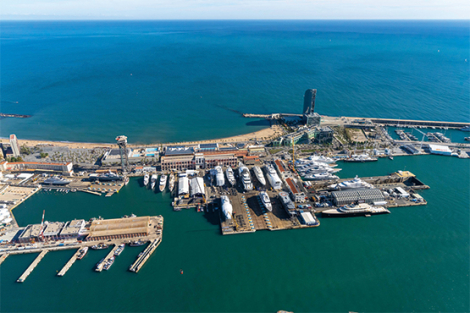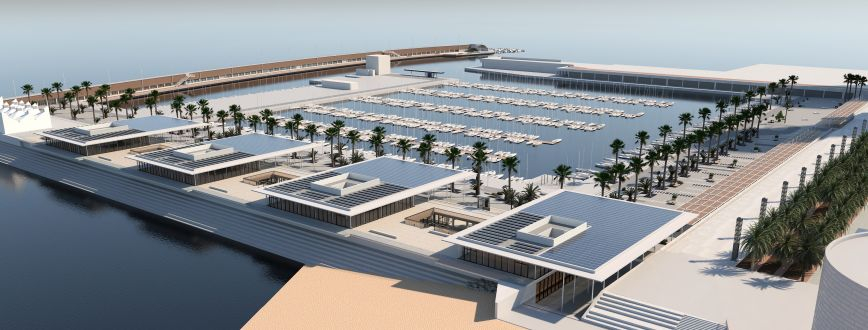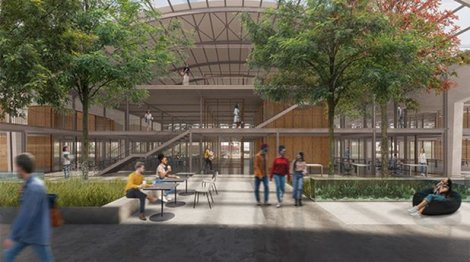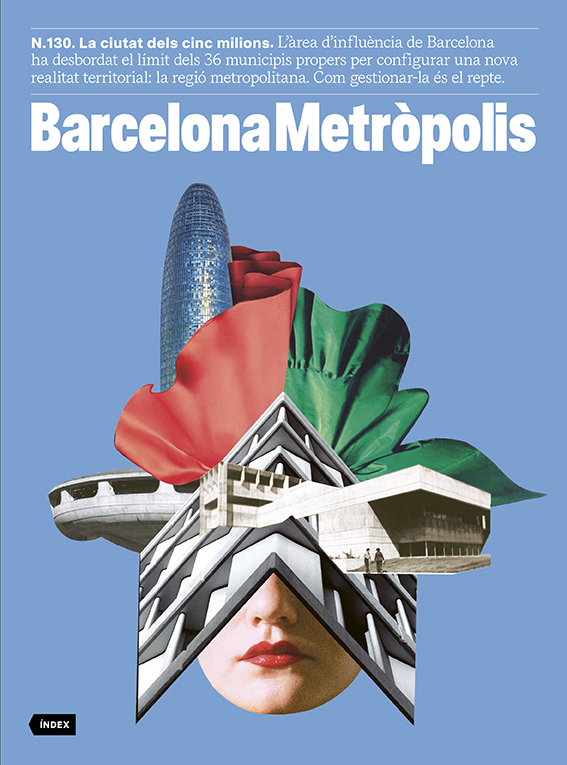The future of Barcelona’s blue economy
- Urban visions
- Apr 24
- 13 mins
The term “blue economy” goes beyond nautical activities and their associated industry. The concept also encompasses fishing, tourism and hospitality, as well as the movement of goods at the port, water treatment, academia and research centres dedicated to studying the marine ecosystem. In Barcelona, this involves 1,200 companies, a turnover of 3.938 billion euros and employment for 16,186 individuals. For all these reasons, the city aspires to secure a place in the international competition, competing with cities like Lisbon and other Northern European counterparts.
In 1520, the Consell de Cent [Council of One Hundred] petitioned Carlos I to launch a naval expedition from the port of Barcelona, aiming to reconquer Constantinople, unify the ancient Roman Empire and put an end to piracy that threatened Mediterranean trade, benefitting some members of the city’s assembly of notables. This endeavour, chronicled in Barcelona. Una biografía [Barcelona: A Biography] by Enric Calpena, proved unsuccessful. Five hundred years later, next August, a fleet of high-speed vessels will gather in the Catalan capital to compete for the America’s Cup, reputedly the third-largest sporting event in the world after the FIFA World Cup and the Olympic Games. Over 68 days of competition, the Barcelona coastline will bask in the global media spotlight. It’s another way of looking at the conquest of the seas, a pursuit in which Barcelona is determined not to lag behind. While the Olympics prompted the city to adopt the mantra of “(re)connecting with the sea” after centuries of neglecting its maritime identity, it now seeks to explore a neologism coined in 1994, championed by the European Commission for the past three years: the “blue economy”.
The blue economy is part of the European Green Deal – the European Commission’s pact to advance decarbonisation and reduce pollution.
Here’s a conundrum that begins with the definition: neither the European Commission, nor the United Nations, nor the OECD, nor the World Bank can agree on a single definition, nor can the involved actors or resources. An article by the Barcelona Centre for International Affairs (CIDOB) even highlighted the challenges of comparing magnitudes in Spain due to each administration’s unique approach. Nonetheless, the blue economy encompasses myriad activities: the traditional fishermen of La Barceloneta, as well as tourism and dining establishments along the city’s ten kilometres of beaches, which appeared seemingly out of nowhere in 1992. It also includes the bustling port of Barcelona, a city within a city, as well as leisure and sports-related nautical activities, and water treatment, more critical than ever in times of drought. Moreover, as the blue economy is part of the European Green Deal – the European Commission’s pact to advance decarbonisation and reduce pollution – it encompasses all research and innovation endeavours aimed at enhancing the sustainability of the marine ecosystem (and the planet). Therefore, the academic community and research centres must not be left behind. In summary, let’s consider three figures: Barcelona Activa estimates that in 2022 all activities related to this sector amounted to approximately 1,200 companies in the city, generating a turnover of 3.938 billion euros (similar to the municipal budget) and employing 16,186 people.
 Marina Barcelona 92, known internationally as MB92, has occupied the Catalunya dock since 2010. It plays host to the world's largest superyachts while they undergo inspection, repair or refurbishment. © MB92 Barcelona, november 2023. Siqui Sánchez
Marina Barcelona 92, known internationally as MB92, has occupied the Catalunya dock since 2010. It plays host to the world's largest superyachts while they undergo inspection, repair or refurbishment. © MB92 Barcelona, november 2023. Siqui Sánchez“Sometimes we forget, but this city owes its existence to the sea”, asserts Jordi Valls, Barcelona City Council’s Deputy Mayor of Economy, Finance, Economic Promotion and Tourism. “We embraced the sea in 1992, but we didn’t just discover the sea”, he continues, “we discovered the beaches. Now, our challenge is to explore the realm of the blue economy, which encompasses economic activities related to it”. Anna Majó, Director of Strategic Sectors and Innovation at Barcelona Activa, and a key figure in shaping the municipal roadmap for the blue economy, offers a different perspective. “Our aim is to create a forum for discussion and gathering: a company thrives in a local business accelerator, meets investors, then competes in a start-up contest at the Tomorrow Blue Economy event [held during the Smart City Expo World Congress in Barcelona], wins the contest and secures funding from a venture capital firm drawn to the city for another occasion. These are the initiatives we hope to foster, like that of a young resident who takes a sailing course at a municipal centre, then pursues studies in Nautical Science and finds employment at Marina 92”. Majó emphasises that “these are developments already underway”.
Companies of all sizes
The company Marina Barcelona 92, to which Majó referred, goes by the name of MB92 on the international scene, and has occupied the Moll de Catalunya dock since 2010. Its presence is hard to miss, as from various vantage points across the city, you can often spot the world’s largest superyachts docked there undergoing inspection, repair or refurbishment. With facilities in Barcelona (and similar ones in Marseille), the company employs around 1,200 people and collaborates with a network of a thousand suppliers. MB92 are world leaders in a sector that, much like the America’s Cup, represents the pinnacle not only of luxury but also of technology. “The ecosystem has been crucial for us; twenty years ago, our workers were entirely foreign – Dutch, British… – and today, through hard work, we’ve achieved the same level of quality and excellence with a local workforce”, explains Carmen Sánchez, the company’s Director of Human Resources, acknowledging the benefits of being situated in Barcelona: “Our location in Barcelona is a draw for both customers and the crews of visiting boats. This is paramount”.
At the other end of the growth spectrum, in pursuit of opportunity, we find SolarBox, a small company with five employees recently honoured for its dedication to developing batteries for the nautical industry. This sector currently lags far behind the automotive industry in terms of zero-emission mobility. Solar Box started out by buying a sailing vessel and exploring the possibilities of electrification. They’ve come to understand that technology can serve as a catalyst for this endeavour, especially in an era where ocean health concerns are impossible to ignore. The situation is so complex that Marc Navarri, one of the company’s founders, recalls being warned about the challenges of being the first to register an electric boat, given the administration’s lack of readiness. Nevertheless, he ultimately completed the paperwork in Poland. “We entered the blue economy in 2021, seeing it as an untapped niche. Although there’s widespread interest in sustainability, there’s still much work to be done”, he points out. Deputy Mayor Valls holds a different perspective, at least in part: “While we have established sectors in the blue economy that need to be made more sustainable, there are others we should explore, such as developing a COVID vaccine from algae or harnessing energy from ocean waves”.
The city is also gearing up for a major transformation inland, with plans to redevelop approximately 50,000 square meters through initiatives led by multiple stakeholders.
In any case, MB92 and SolarBox are examples of the future of the blue economy as outlined in Barcelona’s strategic plan: harnessing existing resources as a driving force, integrating them into the sustainability framework and supplementing them with forthcoming activities that will become commonplace in the coming decades. It involves capitalising on past achievements while embracing the pragmatic notion that there is still much to be done. Furthermore, as the city explores opportunities at sea, it is also gearing up for a major transformation inland, with plans to redevelop approximately 50,000 square meters through initiatives led by multiple stakeholders.
Growth vectors
One of the main initiatives is being undertaken by the Port Authority of Barcelona (APB) at the Sant Bertran docks, where it will invest 50 million euros to convert the existing warehouses into the Blue Tech Port (which originated in 2022 at Pier 01 in Port Vell). It aims to establish the area as a hub for business and research, accommodating activities such as underwater robotics, biodiversity recovery and ocean-related artificial intelligence. “When people ask me about the blue economy, I always emphasise that it’s us, the port”, states Emma Cobos, Director of Innovation and Business Strategy at the APB. The institution, equipped with its own competencies, bears responsibility for a third of this maritime-linked economy, primarily associated with water. “It’s not just about the responsibility we bear; it’s about our capabilities in this domain”, she stresses. While the port has faced social and media scrutiny due to pollution originating from its facilities, Cobos argues that their strategic plan is committed to sustainability through the 70-50-40 Objective. “We aim to achieve approximately 70,000 million euros in foreign trade [currently around 50,000 million], electrify 50% of our docks to mitigate CO2 emissions, and increase the workforce in our facilities from the current 37,000 to around 40,000 individuals. Our goal is to undergo transformation, ensuring that our operations emit fewer emissions and strive for carbon neutrality”, explains the Director of Innovation and Business Strategy at the APB.
 Port Olímpic's revitalisation promises a fresh look for sports and dining options, and will host the city's first hub of maritime-linked economic activity. © BSM/Port Olímpic
Port Olímpic's revitalisation promises a fresh look for sports and dining options, and will host the city's first hub of maritime-linked economic activity. © BSM/Port OlímpicAnother growth vector is the Barcelona Maritime Technology Park, designed to foster business creation and innovation at the port’s Nova Bocana, an initiative developed by Barcelona City Council and the Universitat Politècnica de Catalunya. Thirdly, the Port Olímpic is undergoing a revitalisation, with plans to enhance its sports and dining amenities and establish the city’s first maritime-focused economic hub. Accelerated investments are underway to prepare for the America’s Cup, with the aim of attracting companies engaged in nautical activities, innovation, technology and circular economy initiatives to occupy the former music bars opened in the 1990s.
All those consulted by Barcelona Metròpolis view the America’s Cup as a pivotal moment for the city’s future, regardless of the specific event. Aurora Catà, Vice President of America’s Cup Barcelona, stresses that the event transcends a mere sports competition, championing the legacy it could bestow upon the city. “It represents a convergence of technology and innovation, advocating for diversity [with the inclusion of a women’s competition for the first time], inclusivity and sustainability – values strongly endorsed by both the city and the America’s Cup”, she explains. For example, she advocates for the use, for the first time, of a hydrogen-powered support boat for the competing vessels. “A clear commitment”, she argues, “towards ocean decarbonisation”. But also towards technological transfer to Catalan companies that can work on associated projects.
In addition to the development of new infrastructure, Barcelona Activa has initiated an entrepreneurship project called B-Blue, which currently incubates 23 projects in the acceleration phase. The Barcelona Deep Tech fund has also been established to invest in companies associated with the blue economy, identified as one of the city’s foremost challenges in a survey conducted by the OECD. Another institution, BlueNetCat, serves as a consortium of various research centres and universities dedicated to studying the blue economy. “We are currently at a pivotal moment of expansion”, emphasises Majó.
The ongoing efforts appear to be yielding results. The United Nations have chosen Barcelona as the seat of the Ocean Decade Conference.
The UN turns its gaze to Barcelona
The ongoing efforts appear to be yielding results. For example, the Ocean Decade Conference, in April, is “an incredible opportunity for actors from around the world to collectively reflect on the use of science and knowledge for the sustainable management of the ocean, and in turn pave the way for the future of the decade”, according to Vladimir Ryabinin, Executive Secretary of the Intergovernmental Oceanographic Commission of UNESCO, as stated on the event’s website. The conference will span a week of events, drawing two thousand participants to engage in conferences and debates on critical issues such as climate change, food security, sustainable biodiversity management, the sustainable ocean economy, pollution and natural hazards. The World Ocean Council, a coalition of international companies promoting the maritime economy, has chosen to establish its headquarters in Barcelona, a move that entails hosting its two flagship events, the Sustainable Ocean Summit and the Global Blue Finance Summit. “Barcelona has long sought to rally various interest groups to position itself as a dynamic hub encompassing all aspects of the blue economy. Tangible progress is now emerging, such as the establishment of the World Ocean Council headquarters here”, explains Ignasi Armengol, CEO of the Barcelona Nautical Capital Foundation.
 At the Blue Tech Port, which will relocate from Pier 01 in the Port Vell to the Sant Bertran dock, activities such as underwater robotics, biodiversity recovery and ocean-linked artificial intelligence coexist. © Port de Barcelona
At the Blue Tech Port, which will relocate from Pier 01 in the Port Vell to the Sant Bertran dock, activities such as underwater robotics, biodiversity recovery and ocean-linked artificial intelligence coexist. © Port de BarcelonaThis level of centrality could position Barcelona as a frontrunner in the blue economy if the city successfully carves out a place for itself amidst international competition, where Lisbon and other Northern European cities are also active players. Within the European Union, there is currently no dedicated organisation for this sector, but the prospect of establishing one through the network of European Institute of Innovation and Technology (EIT) in the future is not implausible. “We’ll have clarity on that in two or three years; both as a city and as a country, we’re actively exploring ways to position ourselves, but we must remember that this concept is still relatively new”, remarks Anna Majó. “We need to be ready to compete and, perhaps, to forge alliances with other cities”, Emma Cobos adds. Right now, all the work is ahead of us.
The newsletter
Subscribe to our newsletter to keep up to date with Barcelona Metròpolis' new developments




